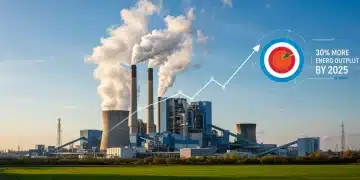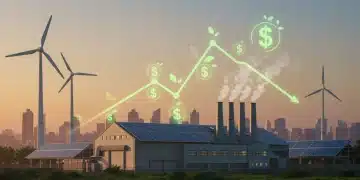
Carbon Capture Technology in 2025: Innovations & 20% Emissions Cut
Breaking news in environmental tech: 2025 sees significant strides in Carbon Capture Technology, with new innovations targeting a crucial 20% cut in industrial emissions, marking a pivotal moment in global decarbonization efforts.

Green Hydrogen: US Investment & 50% Cost Cut by 2030
The U.S. is poised for rapid growth in green hydrogen investment, with a 50% cost reduction projected by 2030. This surge, fueled by policy and innovation, promises substantial economic and environmental benefits.

Green Data Centers: Cutting Energy Consumption by 25% in U.S. Operations
U.S. data centers are actively pursuing a 25% reduction in energy consumption by 2025 through the adoption of cutting-edge green technologies, including advanced cooling systems, AI optimization, and enhanced renewable energy integration.

Solar Panel Efficiency Breakthroughs: 28% More Power by 2025
Recent advancements in solar technology are poised to deliver a significant increase in energy output, with Solar Panel Efficiency Breakthroughs targeting 28% more power by 2025, reshaping the future of green energy.

EPA Regulations & Green Tech: 3-Month Plan for US Manufacturers
U.S. manufacturers are navigating new EPA regulations for green tech adoption. This guide outlines a critical 3-month action plan for compliance, innovation, and competitive advantage in the evolving industrial landscape.

Waste-to-Energy Solutions: Boosting US Power by 30% by 2025
The U.S. is poised to significantly expand its reliance on Waste-to-Energy Solutions, aiming to convert 30% more municipal waste into electricity by 2025, marking a critical step towards sustainable waste management and energy independence.

Ocean Energy Technology: US Aims for 2% Electricity from Tidal, Wave by 2030
The U.S. is actively pursuing ambitious goals for ocean energy, aiming for 2% of its electricity from tidal and wave power by 2030. This initiative marks a significant step towards a sustainable energy future.

Geothermal Power: $1,500 Savings on US Home Energy Bills by 2025
Starting in 2025, U.S. homeowners can anticipate an average annual saving of $1,500 on energy bills as geothermal power expands its unseen potential, offering a stable and cost-effective renewable energy solution.

Smart Grid Integration: Boosting U.S. Energy Reliability by 10% by 2025
Smart grid integration, leveraging green technology, is on track to enhance U.S. energy reliability by 10% by 2025, promising a more stable and sustainable power infrastructure through advanced digital controls and renewable sources.

2025 Outlook: Green Energy Tax Credits Save US Businesses 15%
New green energy tax credits are projected to save U.S. businesses an average of 15% on operational costs in 2025, fostering significant economic incentives for sustainable practices.